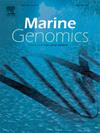假交替单胞菌 M58 的基因组分析揭示其在几丁质生物降解中的作用
IF 1.5
4区 生物学
Q4 GENETICS & HEREDITY
引用次数: 0
摘要
甲壳素是海洋中含量最高的多糖,是由 N-乙酰-D-葡萄糖胺(GlcNAc)通过 β-1,4-葡萄糖苷连接而成的一种高分子量有机物。由海洋细菌驱动的几丁质降解和循环对海洋中碳和氮的生物地球化学循环至关重要。从马里亚纳海沟采集的海水样本中分离出了一种革兰氏阴性好氧菌--假交替单胞菌(Pseudoalteromonas sp.在此,我们报告了菌株 M58 的完整基因组序列及其降解几丁质的基因组特征。菌株 M58 的基因组包含两条环状染色体(分别为 3,348,672 bp 和 723,540 bp)。基因组分析表明,菌株M58含有一组参与几丁质降解的基因,表明它具有降解几丁质的潜在能力。这项研究为海洋微生物降解几丁质提供了新的见解。本文章由计算机程序翻译,如有差异,请以英文原文为准。
Genomic analysis of Pseudoalteromonas sp. M58 reveals its role in chitin biodegradation
Chitin, the most abundant polysaccharide in the ocean, is a kind of high molecular weight organic matter formed by N-acetyl-D-glucosamine (GlcNAc) via β-1,4-glucoside linkage. Degradation and recycling of chitin driven by marine bacteria are crucial for biogeochemical cycles of carbon and nitrogen in the ocean. Pseudoalteromonas sp. M58, a Gram-negative and aerobic bacterium, was isolated from the seawater samples collected from the Mariana Trench. Here, we report the complete genome sequence of strain M58 and its genomic characteristics to degrade chitin. The genome of strain M58 contains two circular chromosomes (3,348,672 bp and 723,540 bp, respectively). Genomic analysis showed that strain M58 contained a set of genes involved in chitin degradation, indicating that it possesses the potential ability to degrade chitin. This study provides novel insights into chitin degradation by marine microorganisms.
求助全文
通过发布文献求助,成功后即可免费获取论文全文。
去求助
来源期刊

Marine genomics
生物-遗传学
CiteScore
3.60
自引率
5.30%
发文量
50
审稿时长
29 days
期刊介绍:
The journal publishes papers on all functional and evolutionary aspects of genes, chromatin, chromosomes and (meta)genomes of marine (and freshwater) organisms. It deals with new genome-enabled insights into the broader framework of environmental science. Topics within the scope of this journal include:
• Population genomics and ecology
• Evolutionary and developmental genomics
• Comparative genomics
• Metagenomics
• Environmental genomics
• Systems biology
More specific topics include: geographic and phylogenomic characterization of aquatic organisms, metabolic capacities and pathways of organisms and communities, biogeochemical cycles, genomics and integrative approaches applied to microbial ecology including (meta)transcriptomics and (meta)proteomics, tracking of infectious diseases, environmental stress, global climate change and ecosystem modelling.
 求助内容:
求助内容: 应助结果提醒方式:
应助结果提醒方式:


